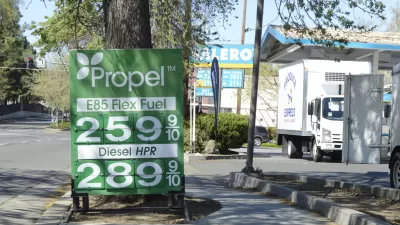Renewable diesel, a biofuel that differs from biodiesel by the feedstock used and its chemical makeup, making it indistinguishable from petrodiesel, is a small but growing industry. The announcement from UPS was welcome news for three companies.
"On (July 29), UPS plans to announce that it will buy as much as 46 million gallons of renewable diesel over the next three years, helping the company reach a goal of displacing 12 percent of the petroleum-based fuels in its ground fleet by 2017," writes Diane Cardwell, Business Day reporter for The New York Times.
The renewable fuels, from three suppliers [noted below], are chemically so close to their petroleum-based counterparts that they can replace them in engines and pipelines. They are made from an array of bio-based sources, including palm* and waste oils, and animal fats.
Renewable diesel is not biodiesel. Here's an explanation from Advanced Biofuels:
- Biodiesel is chemically different from petrodiesel and renewable diesel
- Renewable Diesel, often called “green diesel” or “second generation diesel,” refers to petrodiesel-like fuels derived from biological sources that are chemically not esters and thus distinct from biodiesel. Renewable diesel is chemically the same as petrodiesel, but it is made of recently living biomass
In addition, the feedstock need not be from edible crops. A 2013 study published in the Proceedings of the National Academies of Science found that "up to five percent of grasslands in some states are converted to cropland each year to grow corn and soybeans for ethanol and biodiesel." A 2009 report from the Environmental Defense Fund indicated that emissions from biofuels are undercounted.
"Unlike ethanol or other biofuels, said Mike Whitlatch, vice president for global energy and procurement at UPS, there are no limits on how much renewable diesel can be blended with conventional fuel, so building the market is 'purely a function of how many bio-refineries are built and how much renewable diesel they can produce,'” adds Cardwell.
The market for renewable diesel is much smaller than for biofuel and ethanol — a little more than a billion gallons is produced each year, said Victor Oh, an analyst at Lux Research. But the market is growing faster, he said, and is expected to reach 1.6 billion gallons in the next three years, largely driven by demands for renewable jet fuel.
UPS will purchase renewable diesel from three sources:
- Neste, a Finnish company that is the leading producer of renewable diesel, "including more than half from waste and residues," notes the UPS press release.
- Renewable Energy Group, based in Ames, Iowa, "produces renewable hydrocarbon diesel fuel from waste vegetable oils and animal fats at its Geismar, Louisiana, bio-refinery as well as biodiesel at nine bio refining locations in the U.S.", per press release.
- Solazyme, based in South San Francisco, Calif. which makes an algae-derived oil that is refined into renewable diesel.
Hat tip to Bill Magavern, Policy Director, Coalition for Clean Air.
FULL STORY: UPS Agrees to Buy 46 Million Gallons of Renewable Diesel

Maui's Vacation Rental Debate Turns Ugly
Verbal attacks, misinformation campaigns and fistfights plague a high-stakes debate to convert thousands of vacation rentals into long-term housing.

Planetizen Federal Action Tracker
A weekly monitor of how Trump’s orders and actions are impacting planners and planning in America.

In Urban Planning, AI Prompting Could be the New Design Thinking
Creativity has long been key to great urban design. What if we see AI as our new creative partner?

King County Supportive Housing Program Offers Hope for Unhoused Residents
The county is taking a ‘Housing First’ approach that prioritizes getting people into housing, then offering wraparound supportive services.

Researchers Use AI to Get Clearer Picture of US Housing
Analysts are using artificial intelligence to supercharge their research by allowing them to comb through data faster. Though these AI tools can be error prone, they save time and housing researchers are optimistic about the future.

Making Shared Micromobility More Inclusive
Cities and shared mobility system operators can do more to include people with disabilities in planning and operations, per a new report.
Urban Design for Planners 1: Software Tools
This six-course series explores essential urban design concepts using open source software and equips planners with the tools they need to participate fully in the urban design process.
Planning for Universal Design
Learn the tools for implementing Universal Design in planning regulations.
planning NEXT
Appalachian Highlands Housing Partners
Mpact (founded as Rail~Volution)
City of Camden Redevelopment Agency
City of Astoria
City of Portland
City of Laramie




























